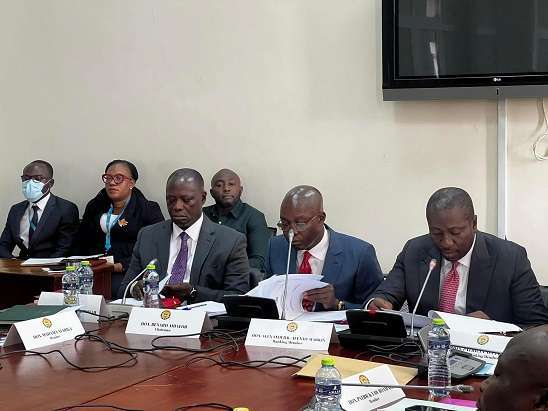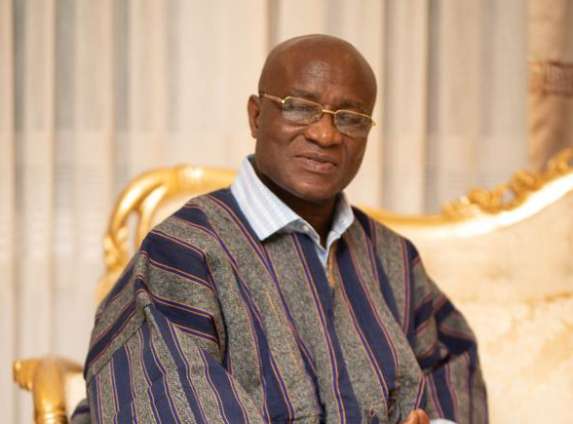Former Majority Leader, Hon. Osei Kyei-Mensah-Bonsu has expressed his views on key parliamentary concerns over the effectiveness of parliamentary oversight in the context of the NDC’s absolute majority.
He highlighted historical precedents, parliamentary practices, and areas requiring improvement to ensure effective governance.
Addressing concerns about whether the NDC’s absolute majority might hinder effective parliamentary oversight of the executive, Hon. Kyei-Mensah-Bonsu dismissed such fears, emphasizing that history shows otherwise.
“In 1993, when the then minority party boycotted the parliamentary elections, there were only two members of parliament who didn’t belong to the NDC or its appendages. The two MPs were Hon. John Ndebugre and Hon. Hawa Yakubu Ogede. Their voices were registered strongly, the people of this country got to know what was wrong with the Rawlings administration.’’
Hon. Osei Kyei-Mensah-Bonsu Former Majority Leader
He further referenced how, despite starting with zero seats in 1993, the NPP made significant gains in subsequent elections due to their hard work in parliament.
According to Hon. Kyei-Mensah Bonsu, the NPP in four years, moved from zero seats to 61 in the next election, representing an over 60% increase. By 2000, they had increased to 102 seats. This history he pointed out shows that a party’s parliamentary success depends on hard work and strategic intelligence between elections.
According to the former Majority Leader, parliamentary oversight hinges not on the numerical strength of the opposition but on the “effectiveness and efficiency of the parliamentary group.” He expressed optimism that if the current parliament works hard, the opposition can position itself to regain power in 2028.
Challenges with the Appointment Committee’s Work
Hon. Kyei-Mensah-Bonsu further expressed dissatisfaction with the ongoing activities of the Appointment Committee, pointing out procedural and structural lapses. The first issue he raised was the composition of the committee. He noted;
“The standing orders provide that there would be a Standing Membership of the Appointment Committee. Then the Committee would be complemented by the subject matter Committee Members. So that, if you have a person nominated for the Finance Ministry, the Standing Members would be there, composed basically of the leadership of the house, and the subject matter Committee – leaders of the Finance Committee- would then join them. Unfortunately, what we’ve seen now is that, even though the Committee has not been composed yet, the Appointment Committee is [proceeding].’’
Hon. Osei Kyei-Mensah-Bonsu Former Majority Leader

He lamented the absence of critical subject matter voices during vetting, which has resulted in unchallenged misleading statements by nominees. He cited an example where a nominee claimed that 130 billion cedis had been allocated to the road sector. He indicated that anyone with basic knowledge of the road sector would know this was misleading. Unfortunately, there was no subject matter expert on the committee to debate or correct him. That to him is a worry.
Another concern raised by Hon. Kyei-Mensah-Bonsu was the lack of adequate public involvement in the vetting process. He explained that the Appointment Committee has always advertised for public participation in vetting by allowing citizens to submit memoranda about nominees. Unfortunately, this has not been done. This omission he bemoaned undermined transparency and accountability.’’
Hon. Kyei-Mensah-Bonsu stressed the importance of public involvement, noting that while nominees may appear competent, public input is critical in revealing potential hidden issues. He stated;
“Personally, I would not doubt persons like Haruna Iddrisu or Dr. Ato Forson their competence. But we never know what is behind the curtain, so let the public have their say in it and then we can go.”
Hon. Osei Kyei-Mensah-Bonsu Former Majority Leader
The former Majority Leader also questioned the overall efficiency of the vetting process under the current conditions. He argued that the current approach undermines the credibility of the committee’s work and limits its ability to hold nominees accountable.
His reflections on historical precedents underscore the potential for parliamentary effectiveness, regardless of numerical strength, provided there is strategic planning and hard work.
However, his concerns about the Appointment Committee’s procedural lapses call for urgent reforms to ensure transparency, inclusivity, and accountability.
READ ALSO; Stonebwoy’s Younger Brother Joins Ghana Premier League Club




















